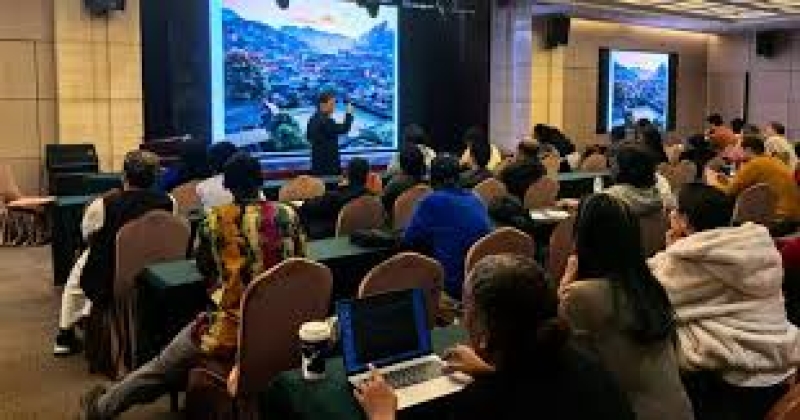- Israel Strikes Tehran with US Support Amid Nuclear Tensions |
- India Sees 9% Drop in Foreign Tourists as Bangladesh Visits Plunge |
- Dhaka Urges Restraint in Pakistan-Afghan War |
- Guterres Urges Action on Safe Migration Pact |
- OpenAI Raises $110B in Amazon-Led Funding |
China Boosts Ethnic Unity with Vision of Shared Future

In recent years, China has intensified efforts to promote unity among its 56 ethnic groups, emphasising cultural exchange, economic inclusion, and national identity.
Under President Xi Jinping's leadership, the government has advocated for a stronger sense of community among all ethnic groups—Han and minorities alike—fostering what it calls a "shared future of the Chinese nation."
As development initiatives extend into remote regions and cultural integration deepens, the policy aims to bridge historical divides and build lasting national cohesion.
Keyong He, professor of Foreign Studies at Minzu University of China, shared the information in a lecture held at Multi-functional Hall in Diplomatic Residence Compound (DRC) in Beijing on Monday.
He said that China has taken different types of policies on ethnic affairs since 1950s.
1. a system--ethnic regional autonomy as a basic political system;
2. relevant laws, rules and regulations
a. to ensure national unity and ethnic equality;
b. to ensure the rights of all ethnic groups to participate in the decision-making process;
c. to foster economic development in ethnic minority regions;
d. to promote the ethnic minority cultures;
e. to accelerate development of the education in ethnic minority areas;
f. to encourage improved integration of ethnic minorities into urban areas.
According to the Law for Ethnic Regional Autonomy(in effect in 1984 and revised in 2001), the national government has the obligation to help development of the autonomous regions, materialized in in the national Plan for national economic and social development.
Besides, the National Ethnic Affairs Commission started the programme to improve the lives of the ethnic people who comprise 48 percent of the 21 million residents in 135 counties along the borderline in 1998.
Favorable policies and direct financial investment were granted to improve the infrastructure and public facilities, develop education, promote literacy, boost trade and nurture industries. By 2005, the government spent at least 15 billion yuan in the border areas through the programme, benefiting 21 million people.
In response to a journalist's question, Professor He said that any country wishing to move forward must ensure the interests of all minorities.
Special policies for ethnic minorities
1. administration institutionalization a division responsible for ethnic education set up in education administration at all levels
2. Special funding and subsidies
3. Diversity of schooling forms
Ethnic primary, high, vocational, technical schools, colleges and universities, mainly serving ethnic minority students
Special policies for ethnic minorities
4. Teaching modes and methods catering for ethnic needs
5. Ethnic languages are used for instruction where they are densely populated;
6. bilingual instruction is carried out where ethnic minorities have more communication with Han;
7. Privilege for ethnic minorities in university admission
State council instruction on Accelerating Education in Central and Western Regions in China issued in 2016
* By 2020, a total of 30,000 teachers from more developed areas to Tibet and Xinjiang to fill the teaching vacancy left by the 90% of local science teachers who can receive full-time training according to the new teaching-assisting programme;
* More Tibetan and Xinjiang classes are arranged in more developed areas.
Ethnic minorities in China play a vital role in shaping the country’s rich cultural diversity and heritage. With 55 officially recognized minority groups alongside the Han majority, these communities contribute distinct languages, traditions, and customs to Chinese society. While the government has implemented various policies to support their development and preserve their cultures, challenges still remain, particularly regarding equal access to education, economic opportunities, and the freedom to fully express their cultural identities. Promoting mutual respect and inclusive policies is essential for ensuring that all ethnic groups in China can thrive while contributing to the nation’s unity and progress, reports UNB.

